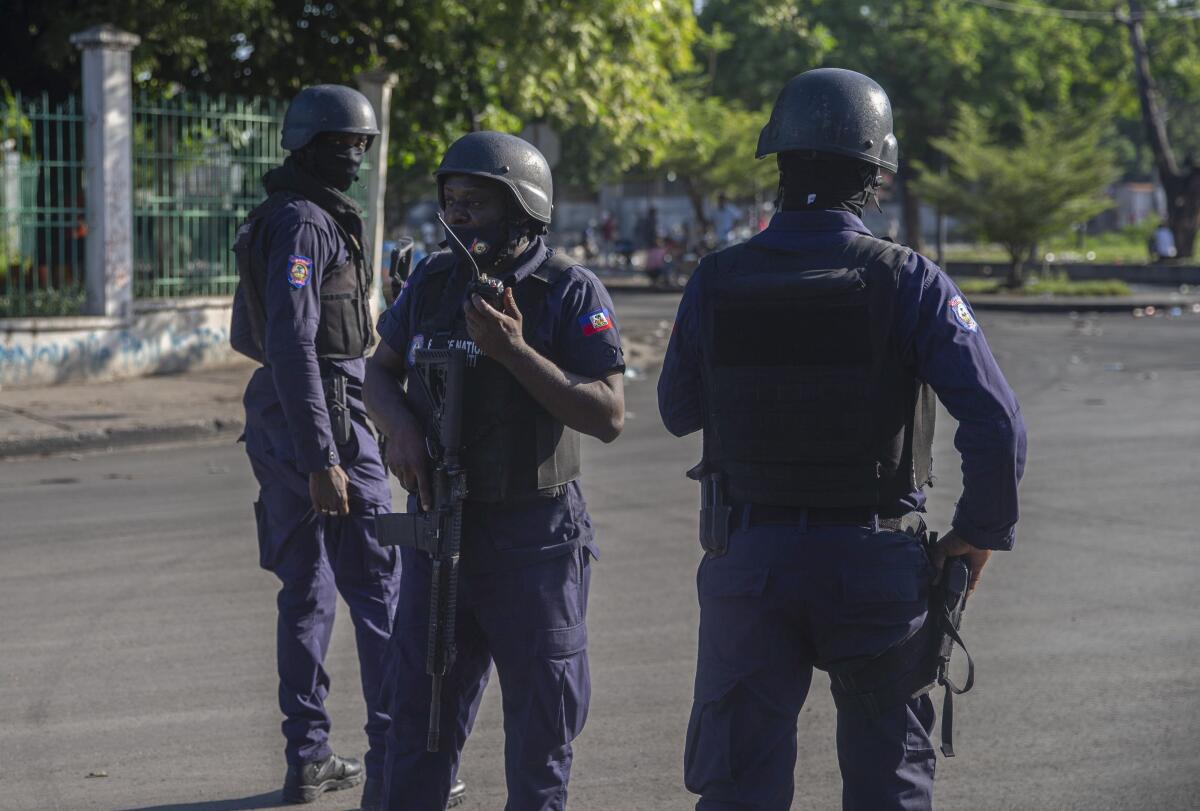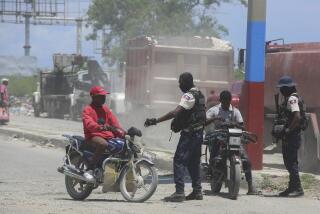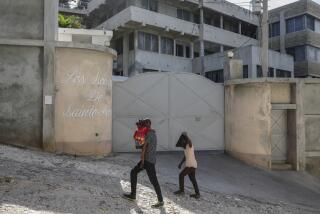Kidnapping of American missionaries in Haiti highlights the perils of religious workers abroad

- Share via
Haiti, suffering from a long string of natural and political disasters, is also plagued by lawlessness. Kidnappings are on the rise, with more than 300 reported in the first eight months of 2021, according to the United Nations.
Even so, the hostage-taking on Saturday of 17 people associated with an American Christian aid group by a gang in Port-au-Prince stands out for its brazenness. It also illustrates the dangers American religious missionaries face while seeking conversions abroad.
Here are several other high-profile cases of American religious workers who were kidnapped or killed across the globe.
Philippines
Martin and Gracia Burnham, Christian missionaries from Kansas who had been working in the Philippines for 17 years, were celebrating their wedding anniversary at a resort one night in 2001 when gunmen wearing ski masks abducted them and more than a dozen others.
They were held in captivity for more than a year by a jihadist group called Abu Sayyaf, which demanded $1 million in ransom for the Americans.
A 2002 government operation to free them from the mountainous jungle hideout where they were being held ended in disaster, with Martin Burnham and another kidnapping victim, Filipino nurse Deborah Yap, both killed. Gracia Burnham was shot in the leg but survived.
El Salvador
In 1980, one year into a bloody civil war that pitted a military-led government against leftist rebels, four female Catholic missionaries from the United States were raped and killed in El Salvador.
Four Salvadoran national guardsmen were eventually convicted in the murders, with all later saying they were acting on “orders from above.”
The killings, which came just months after the slaying of Oscar Romero, the Catholic archbishop of San Salvador, were widely believed to be politically motivated. Many in the Catholic church had denounced brutal repression by the Salvadoran military, which over the course of the war killed thousands of people suspected of sympathizing with the rebels.
The killings of the missionaries — three nuns and one lay woman — sparked outrage worldwide and led to new scrutiny of widespread U.S. support for El Salvador’s then-military government.
Russia
Mormon missionaries Andrew Lee Propst and Travis Robert Tuttle were living in Saratov, Russia, in 1998 when they were invited to the apartment of a man who said he wanted to learn more about their faith. Instead of having a conversation about religion, they were attacked, handcuffed and blindfolded.
The kidnappers demanded $300,000, but after news coverage of the incident mounted, the perpetrators released their victims with no ransom paid.
The mastermind of the abduction was sentenced to four years in prison. The incident was later the subject of an American film, “The Saratov Approach.”
Somalia
Scott Adam had a successful Hollywood career — he had worked on film and television hits such as “The Goonies” and “The Love Boat” — when he had a religious awakening and became a Christian pastor.
He and his wife, Jean, dedicated their lives to spreading Scripture around the world, taking to the seas on their 58-foot yacht and distributing Bibles in different languages in far-flung corners of the globe.
The couple and two friends were sailing off the coast of Oman in 2011 when their yacht, Quest — named after a church where Scott Adam had worked — was attacked by Somali pirates.
U.S. Navy warships were dispatched for negotiations with the hostage-takers , but the pirates shot and killed the Adams and their friends.
Ecuador
In 1957, five American men flew to a remote rainforest in eastern Ecuador with the hope of bringing Christianity to the native Waorani people. After radio contact ceased with a base station, a search ensued, and the men were found dead, having been killed with spears.
The story took a surprising turn when Elisabeth Elliot, the wife of one of the victims, returned to the region a few years later with her 3-year-old daughter. She lived alongside the Waorani for two years, later telling LIFE magazine that she understood why the missionaries were killed. The killer “was trying to preserve his own way of life, his own liberty,” she said. “In America, we decorate a man for defending his country.”
Elliot went on to become a well-known speaker and author of 20 books, including one about Irish missionary Amy Carmichael, concerning the often complicated motivations of missionaries.
More to Read
Sign up for Essential California
The most important California stories and recommendations in your inbox every morning.
You may occasionally receive promotional content from the Los Angeles Times.










